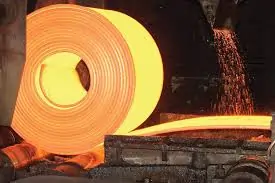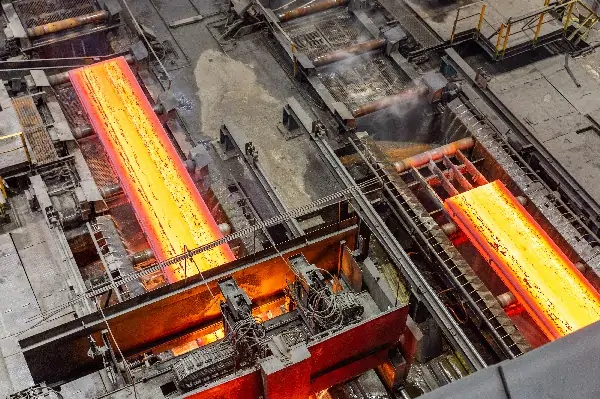Hot-rolled steel strip coils are among the most widely used materials in the construction, manufacturing, and engineering industries. Known for their strength, durability, and cost-effectiveness, these coils serve a broad range of applications from automotive components to heavy machinery and structural frameworks, for businesses looking to purchase hot-rolled steel strip coils in bulk, understanding the material, specifications, and sourcing strategies is crucial.
What Are Hot-Rolled Steel Strip Coils?
Hot-rolled steel strip coils are produced by heating steel slabs above their recrystallization temperature, usually around 1,100°C, and then passing them through rollers to achieve the desired thickness and width. The process allows the steel to be shaped easily and ensures uniformity in mechanical properties across the strip. Unlike cold-rolled steel, hot-rolled coils have a rougher surface finish and may contain slight scale, but they offer superior strength and flexibility for structural and industrial applications.
Key Characteristics of Hot-Rolled Steel Strip Coils
-
High Strength: The rolling process refines the steel’s grain structure, resulting in excellent tensile strength.
-
Durability: Hot-rolled coils can withstand heavy loads, making them ideal for construction and heavy machinery applications.
-
Versatility: Available in various thicknesses and widths, these coils can be used in multiple industries.
-
Cost-Effective: The production process is relatively efficient, making hot-rolled coils more affordable than cold-rolled steel for bulk purchases.
Applications of Hot-Rolled Steel Strip Coils
Hot-rolled steel strip coils are integral to numerous industries:
-
Construction: Used in beams, girders, roofing sheets, and structural supports.
-
Automotive Industry: Components like chassis parts, panels, and reinforcements are often made from hot-rolled steel.
-
Shipbuilding: The steel’s toughness makes it suitable for ship hulls and structural components.
-
Machinery and Equipment: Heavy-duty equipment frames and industrial machinery often utilize these coils.
-
Pipe and Tube Manufacturing: Hot-rolled steel strips can be processed into welded or seamless pipes.
Understanding the application helps businesses determine the required specifications, thickness, and grade when buying in bulk.
Grades and Standards
Hot-rolled steel strip coils are manufactured according to international standards to ensure consistency in quality and performance. Common standards include:
-
ASTM Standards: Widely used in the U.S., including ASTM A1011 for structural steel coils.
-
EN Standards: European standards like EN 10025 ensure uniform mechanical properties.
-
JIS Standards: Japanese Industrial Standards such as JIS G3101 for hot-rolled steel.
Grades differ based on carbon content, tensile strength, and other alloying elements. Choosing the correct grade ensures the steel meets the specific structural and mechanical requirements of the project.
Bulk Buying: Advantages
Purchasing hot-rolled steel strip coils in bulk offers several advantages:
-
Cost Savings: Bulk orders often attract discounts from suppliers, lowering per-ton costs.
-
Consistent Supply: Ensures uninterrupted production for manufacturing and construction projects.
-
Standardized Quality: Buying in large volumes from reputable suppliers ensures uniform quality.
-
Reduced Shipping Costs: Consolidating shipments reduces transportation expenses.
Businesses planning large-scale projects or long-term manufacturing processes often find bulk purchasing the most efficient and economical approach.
Factors to Consider When Buying Hot-Rolled Steel Strip Coils in Bulk
To ensure a successful bulk purchase, several factors should be carefully evaluated:
1. Steel Grade and Thickness
Selecting the appropriate grade and thickness is critical for the performance and durability of the final product. Structural applications may require higher strength steel, while automotive or light manufacturing applications may use lower grades.
2. Coil Dimensions
Coil width, thickness, and weight must align with production capabilities. Oversized or undersized coils can create processing challenges and increase waste.
3. Surface Finish
Hot-rolled steel naturally has a rough surface. Depending on the application, some buyers may require pickled or coated finishes to improve surface quality.
4. Supplier Reputation
Working with reliable suppliers is essential. Bulk buyers should assess suppliers based on quality certifications, delivery timelines, and previous customer feedback.
5. Logistics and Delivery
Transportation and storage are important considerations. Hot-rolled steel coils are heavy and require specialized handling equipment. Ensure the supplier can manage safe delivery in bulk quantities.
6. Price and Payment Terms
Compare prices from multiple suppliers while considering payment terms. Bulk buyers often negotiate favorable rates or installment options to manage cash flow efficiently.
Sourcing Hot-Rolled Steel Strip Coils
Finding the right supplier is a key step in bulk buying. Global suppliers cater to different industries, and local distributors may offer faster delivery. Some common sourcing options include:
-
Steel Mills and Manufacturers: Directly purchasing from mills can provide the best pricing and assurance of quality.
-
Authorized Distributors: Distributors may provide additional services such as cutting, slitting, and packaging.
-
Online Steel Marketplaces: Digital platforms allow buyers to compare prices, specifications, and supplier reviews before placing bulk orders.
It’s recommended to request a sample or conduct a quality inspection before placing large orders to prevent discrepancies.
Storage and Handling of Hot-Rolled Steel Coils
Proper storage ensures the integrity of steel coils and prevents damage:
-
Keep Dry: Avoid exposure to moisture to prevent rust and corrosion.
-
Flat Storage: Coils should be stored on flat surfaces with appropriate supports to maintain shape.
-
Protective Coatings: Apply anti-corrosion coatings if long-term storage is required.
-
Safe Handling: Use cranes or forklifts with coil hooks to move heavy coils safely.
Efficient storage and handling reduce losses and ensure consistent quality for production.
Conclusion
Hot-rolled steel strip coils are indispensable in modern manufacturing, construction, and engineering industries. Bulk purchasing offers significant advantages in terms of cost savings, supply consistency, and operational efficiency. However, successful bulk buying requires careful attention to grade, dimensions, supplier reliability, and handling procedures. By understanding these factors, businesses can ensure they receive high-quality steel that meets project requirements and supports long-term growth.
Whether you are a manufacturer, contractor, or distributor, investing time in evaluating hot-rolled steel strip coil specifications and suppliers will pay off in smoother operations, reduced costs, and high-performance end products.






